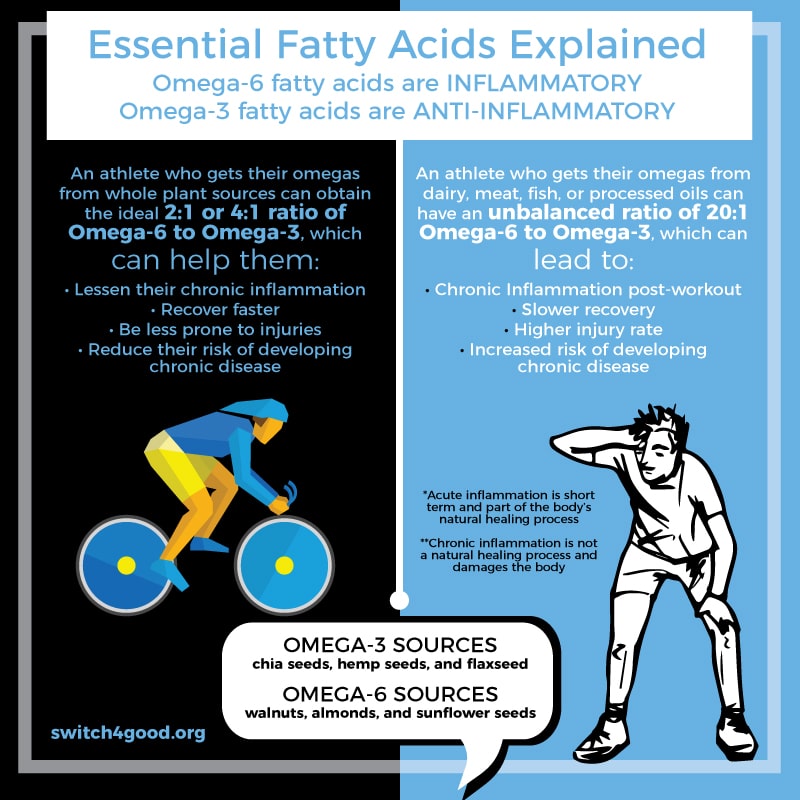Everything You Need to Know About Omegas is a guest post by Rick Scott (#veganhockeyplayer)
Lacing up my skates in the locker room, I’m asked questions daily about how I eat, what I drink on the ice, and how I recover. The guys know that I am vegan, that I take meticulous care of my body when it comes to conditioning and recovery, and that I am knowledgeable about nutrition. I take pride in being the #veganhockeyplayer, a 53-year-old athlete whose favorite training partners are elite college students and young twenty-somethings – not because I’m at their skill level, but because I am the fittest player on the ice possessing boundless energy and endurance.
Pride, as the saying goes, comes before a fall. That’s how I felt when asked to write about omega-3, omega-6, and omega-9. I had been taking omega-3 supplements for a couple of decades, but…and I’m slightly embarrassed to admit this…I did not know there were two more omegas: omega-6 and omega-9. Does this mean that I’ve been missing out on important fatty acids?
Although I’ve been plant-based for over 28 years, ten years ago, a nutritionist convinced me to ditch my omega-3 supplement made from flaxseeds in favor of using a non-vegan supplement made from fish oil. She claimed that the fish oil supplement was more effective and easier to absorb than a flaxseed oil supplement. That advice does not sit well with a vegan, so I searched for a second expert opinion.
Thankfully, Dr. James Loomis was available to school me. Dr. Loomis has the championship credentials of having been the internist for the Super Bowl-winning St. Louis Rams and World Series-winning St. Louis Cardinals. A highly-respected plant-based doctor, he presently serves at Barnard Medical Center in our nation’s capital.
The Basics of Omegas
Dr. Loomis helped me understand the science behind omegas in a language I could understand. Omega-3, omega-6, and omega-9 are important dietary fats, and an imbalance may cause a host of chronic diseases. The body does not produce omega-3 or omega-6 thus one must get these essential fats from food or supplementation. Omega-3 fats (polyunsaturates) are a vital part of cell membranes that have the function of improving heart health, bolster mental health, aid in weight management, reduce fat in the liver, fight inflammation, enhance bone density, and reduce asthma symptoms. The three most common omega-3s are EPA (eicosapentaenoic acid), DHA (docosahexaenic acid) and ALA (alpha-linolenic acid).
A polyunsaturate like omega-3, omega-6 fatty acids also come from our diet and are primary sources of energy. When too many are present in the body, they increase chronic inflammation, which is a disease starter. We need them in the right quantities, but most Western diets contain much more than necessary for optimum health.
“The two most important for general health – especially for athletes – are omega-3 and omega-6, particularly the ratio between the two. Omega-3s are primarily anti-inflammatory. Omega-6s have inflammatory properties when metabolized downstream. We have to have [acute] inflammation to heal wounds or to fend off an infection. [Acute] Inflammation is an important part of our physiology,” said Dr. Loomis.
It’s the ratio between the two omegas that Dr. Loomis focuses on when it comes to his patients.
“The ideal ratio in our ancestral diet is 2:1 or 4:1 of omega-6 to omega-3. The problem is that in the standard American diet, even if we are eating what people perceive as “healthy” – low-fat dairy and “lean” meat – you can see ratios in the 20:1 range. If you go to McDonald’s a few times a week, you’ll see ratios that are 50:1. The standard American diet is highly, highly inflammatory,” said Dr. Loomis.
As athletes, we ice the body to reduce inflammation after workouts and competition. Internally, chronic inflammation from diets that include dairy and animal meat contain too much omega-6, which may lead to cancer, heart disease, multiple sclerosis, Alzheimer’s disease, and other chronic diseases.
Dr. Loomis said, “[Chronic] inflammation is what lays at the core of most diseases. Most of that is driven by the standard American diet because it is so highly inflammatory.”
Inflammation appears in the body in two forms: acute and chronic. Acute inflammation [the good kind] is part of the body’s natural healing process, appearing as scabbing, swelling, redness and puss. Chronic inflammation [the bad kind] is not part of the body’s healing process. This is the type of inflammation that does damage to the body.
Omega-9 does not concern Dr. Loomis since it is produced by the body, therefore making them non-essential (i.e. not needing to come from food or supplementation). These monounsaturated fats produce less inflammation and may benefit metabolic health.

Omega Sources
“Ultimately, [omega-3s and omega-6s] are all plant-based. While many people think the best source is oily, fatty fish, they ultimately come from phytoplankton and algae,” said Dr. Loomis.
Fish get their omega-3 from phytoplankton and algae, so you might as well consume the direct source instead of the middle man.
“The other primary sources are chia seeds, hemp seeds, and flaxseed, which are very rich in omega-3. On the omega-6 side, most come from the standard American diet of meat and dairy. However, if you go up the food chain, they’re all plant-based. It’s the edible oils [corn oil, olive oil, peanut oil, soybean oil, etc.] that are the primary sources of omega-6 – even in a vegan diet. In my clinic, that’s why I make a distinction between a vegan diet and a plant-based diet.
A whole-foods, plant-based diet really limits these highly-processed edible oils. Take corn oil. It has an 83:1 ratio of omega-6 to omega-3; it’s one of the most inflammatory oils out there. And that’s what we put into our food chain, which is insane,” said Dr. Loomis.
What about my former nutritionist’s recommendation to take a fish oil supplement?
“If you eat an inflammatory diet, the answer is not to eat a bunch of fish oil supplements, because unless you get your omega-6 intake down, you can’t even convert that fish oil downstream to DHA and EPA. And I think that’s something we don’t pay attention to. The answer ultimately is to really try to decrease your omega-6 intake. Again, it comes from meat and dairy, but in a plant-based diet, it comes from edible oils.”
Nuts and seeds are excellent sources of omega-6. Adults can get more than enough with a single serving of 12 to 17 grams of walnuts, almonds, cashews, or sunflower seeds.
What About Supplements?
“There are some patients that I do put on an algae-based omega-3 and omega-6 supplements. Primarily it’s patients that have chronic inflammatory diseases like autoimmune diseases – Crohn’s disease, psoriasis, and rheumatoid arthritis. For some athletes, I suggest using it in a heavy training phase. Let me explain why.
Getting rid of edible oils, even in a plant-based diet, is somewhat difficult, especially if you’re traveling for competitions. I do recommend using an omega-3 supplement judiciously. Not for everybody. For instance, I take it when I’m in a heavy training cycle. There’s not a ton of evidence that it helps, but there is a little bit,” said Dr. Loomis, who is also a triathlete and currently training for his first IRONMAN.
Dr. Loomis continued, “I think that depends on your diet. If you’re eating really clean, if you’re not using any edible oils, cooking oil-free, and not eating potato chips and oily stuff like that, you’re probably okay without [a supplement].”
For those taking the supplements, is fish oil indeed a better source of omega-3 than flaxseed oil?
“When you ingest flaxseed oil, it has to be converted to DHA and EPA. When you take fish oil, it’s already pre-converted. The issue is that almost all the fish oil supplements today are highly contaminated with mercury. A lot of it is coming from farmed fish so it’s got pesticides and hormone disrupters. It’s really nasty business and it’s not good for the environment. We overfish the ocean to start with and to get the number of fish that are harvested just to make this fish oil is pretty substantial.”
All this newfound knowledge about the three omegas leaves me feeling somewhat vindicated for having focused exclusively on getting enough omega-3. While we don’t have to be concerned with omega-9, it’s best to limit the amount of inflammation-producing omega-6 by reducing edible oil consumption. If not, we may have to fight disease, a penalty that will take away time and quality of life.








